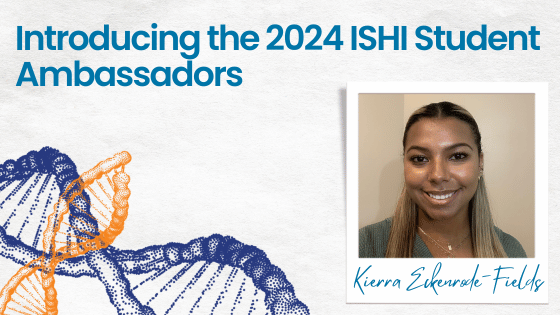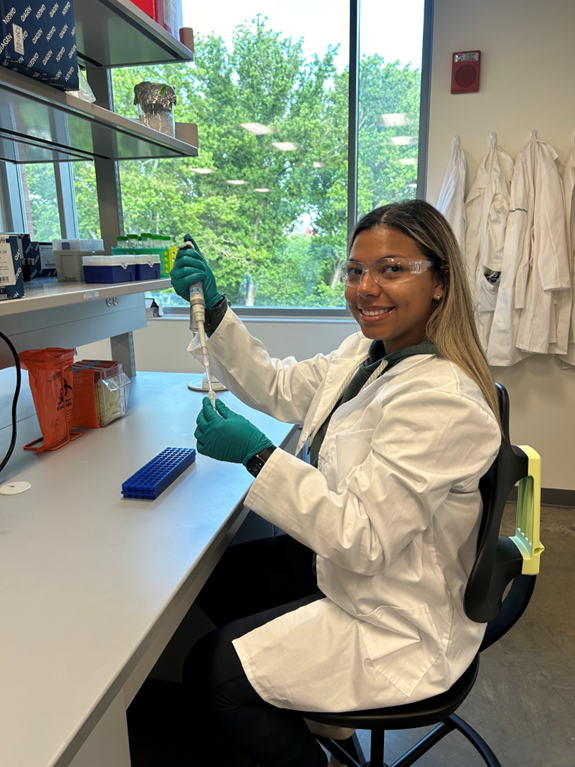Kierra Eckenrode-Field’s first introduction to forensic science was when she was twelve years old. Kierra had recently taken an interest in the DC and Marvel comics and a new show called “The Flash” had just come out. The main character, Barry Allen, is a forensic scientist. After researching the field, she knew this was the path for her. Not only would she be able to work in biology, a subject Kierra had always enjoyed in school, but she would also get to play a part in serving justice.
Now, ten years later, Kierra has maintained her love for forensic science, earning a bachelor’s degree in forensic chemistry with a concentration in DNA analysis. She is currently pursuing a master’s degree in forensic science at Towson University, and again concentrating in DNA analysis.
After graduating next spring, Kierra would love to immediately start working in the forensics field as a DNA analyst. As she progresses in her career, a goal of hers would be to aid in forensic investigative genetic genealogy cases. There are so many unsolved crimes containing DNA evidence that have not been able to be matched to a suspect. Forensic investigative genetic genealogy (FIGG) has shown to be a successful tool in aiding in the process of identifying the individuals responsible for these crimes. If implemented into forensic laboratories, FIGG could greatly reduce the time it takes to identify suspects in cases where DNA was left behind. Kierra aspires to work in this discipline to seek justice for victims who thought they may never get it, and to ensure current and future victims do not have to wait decades for an answer.
We caught up with Kierra and asked her to tell us a little more about herself, including how she became interested in forensic science, what she plans to do after graduation, and what she’s most looking forward to at ISHI this year.

What are your specific areas of interest within forensic DNA analysis?
I have developed a particular interest in forensic investigative genetic genealogy. This technique has proven to be a useful aid in cold cases. If implemented into forensic laboratories, there could be a significant improvement in the time it takes to identify suspects. Although my research project is not in this specific area, I hope to work on future projects more closely related to forensic investigative genetic genealogy.
What are some of the latest developments or technologies in forensic science that excite you the most?
NGS is something that I am looking forward to learning more about. It has such a large range of capabilities and can greatly improve different areas of forensic genomics. For example, NGS is able to analyze SNPs and STRs for a large number of markers using a single test. This is much more efficient than having to use multiple analysis kits to achieve the same results. I am excited to hear more about the applications of NGS from leading experts in the field.
Who in the field of forensic science do you most admire and why?
I really admire CeCe Moore and all the work she has done with genetic genealogy. Not only has she assisted law enforcement in solving cold cases, but she’s also helped people determine their lineage, and has reunited families. Moore has also taken time to try and educate the public about the capabilities of genetic genealogy, so that people are aware of its potential and applications. I’m excited to see what she will be doing next!

What's the most interesting thing you've learned so far in your forensic science studies?
Something I have found interesting is the use of insects to determine time of death. I think it’s such a cool concept, to be able to track the life cycle of insects on or near a body and use that to determine how long the person has been deceased. It’s interesting to see how different areas of study can be used and applied to forensics.
How do you handle stress or pressure, especially when dealing with challenging studies or research?
When I am feeling stressed or under pressure, I try to relax my mind as much as possible. I really enjoy watching movies, so that is typically my go to stress reliever. I will either watch something I haven’t seen before or one of my favorite movies. This allows me to temporarily escape my reality, taking my mind off stress and pressures in my life.
What's one thing you're hoping to learn from your experience as a Student Ambassador?
I am hoping to learn as much as possible from all individuals attending ISHI. Being a student ambassador is an amazing opportunity that will allow me to learn from the expertise of many people in the field. I am excited to meet people from all different backgrounds and gain knowledge from them, as this will be a large influence on my career in forensic science.
What are your aspirations for the future after completing your education?
After graduating next Spring, my goal is to work in the forensics field as a DNA analyst. A major career aspiration of mine is to one day aid in forensic investigative genetic genealogy cases.

